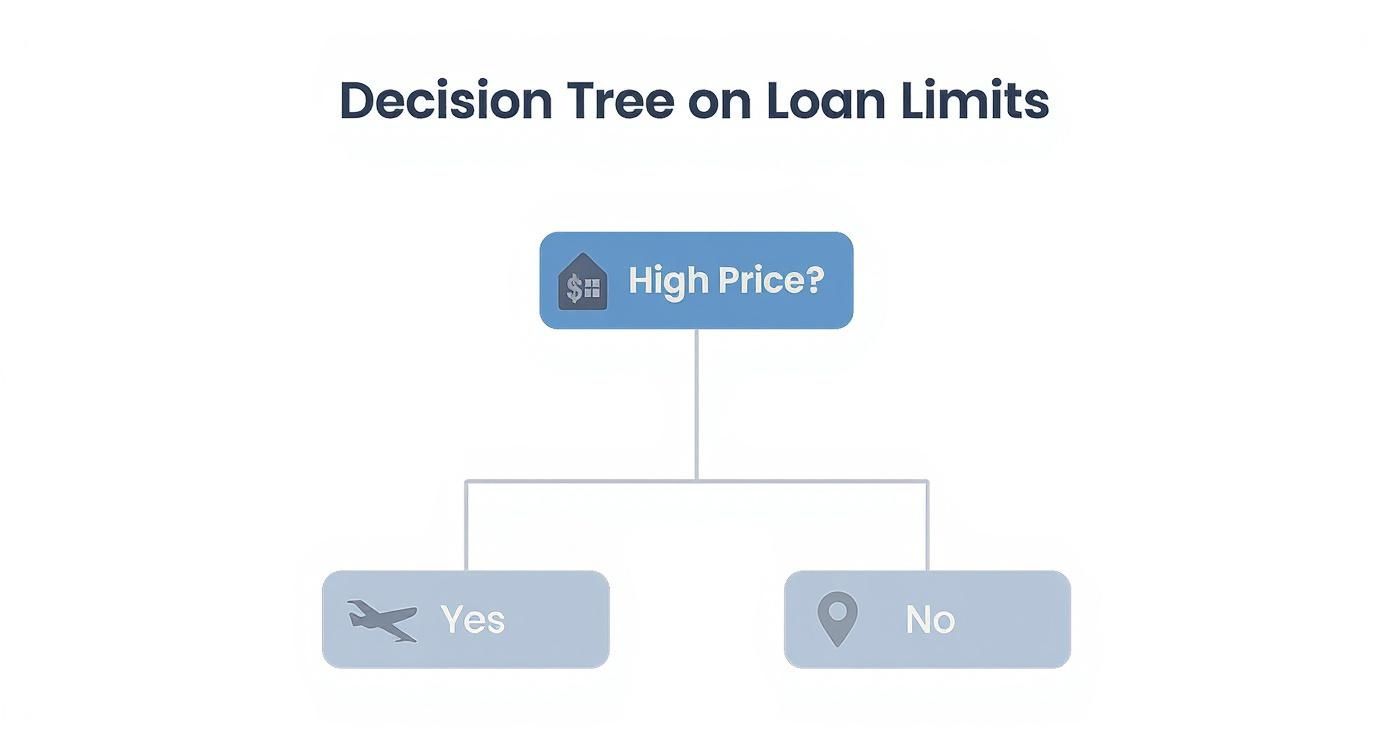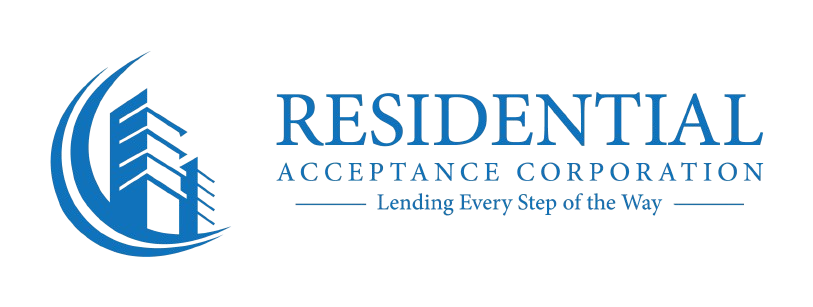When you're buying a home in Tampa, one of the first big decisions is picking the right mortgage. It really boils down to two main options: FHA loans and conventional loans. The one that’s right for you depends entirely on your financial situation. Think of it this way: FHA loans are government-backed, designed to help folks with less-than-perfect credit or not a lot saved up for a down payment. On the other hand, conventional loans are better suited for buyers with a stronger financial track record.
Getting this distinction right from the start is crucial for making a smart financing choice in Tampa's competitive market.
FHA vs Conventional Loans: An Overview for Tampa Buyers
Trying to navigate the Tampa real estate scene means you need a mortgage that fits your life right now. FHA and conventional loans are the two most traveled paths to homeownership, but they serve very different buyers. Let's break down how they work so you can see which one makes more sense for you.
An FHA loan is insured by the Federal Housing Administration. What does that mean for you? It means the government protects lenders like Residential Acceptance Corporation (RAC Mortgage) if a borrower can't make their payments. Because of that government safety net, we can offer loans to people who might otherwise be turned away, which is a huge deal for many Tampa buyers.
A conventional loan, however, isn't insured by the government. These are mortgages from private lenders that follow rules set by national mortgage associations. To get one, you typically need a more solid financial history, but the payoff can be better loan terms over the long haul.

Key Distinctions at a Glance
So, what are the real, practical differences? The biggest ones are the credit score and down payment requirements. This is where you can clearly see who each loan is designed for.
FHA loans are incredibly flexible, welcoming buyers with credit scores as low as 580 and only requiring a 3.5% down payment. Conventional loans, in contrast, usually need a credit score of at least 620. If you want to dig deeper, you can learn more about how credit scores impact loan options from Experian.
To make it even simpler, here’s a quick table from us at RAC Mortgage that lays out the main trade-offs you’ll be considering as a Tampa homebuyer.
FHA vs Conventional Loans At a Glance
| Feature | FHA Loan | Conventional Loan |
|---|---|---|
| Best For | Borrowers with lower credit scores and smaller down payments. | Borrowers with strong credit and more substantial savings. |
| Minimum Down Payment | Typically 3.5%. | Can be as low as 3%, but 5%-20% is common. |
| Credit Score Minimum | Generally 580+. | Typically 620+. |
| Mortgage Insurance | Required on all loans (MIP) and often lasts for the loan's life. | Required if down payment is less than 20% (PMI), but is cancelable. |
This table gives you a snapshot, but the most important difference to zoom in on is the mortgage insurance. With an FHA loan, you're paying for it for the long run. With a conventional loan, once you hit 20% equity, you can say goodbye to that extra payment, saving you a lot of money over time.
Down Payment and Credit Score Rules: What's the Real Difference?
When you're trying to buy a home in Tampa, two numbers always seem to come up first: your down payment and your credit score. These two figures are really at the heart of the FHA vs. conventional loan debate. They don’t just determine if you get approved; they shape the entire cost and structure of your mortgage. Getting a handle on these rules is your first step to picking the right loan.

This is where you see the core purpose of an FHA loan. It’s built to open the door to homeownership, especially for people who haven't had the chance to build a flawless credit history or save up a massive down payment. For many Tampa buyers, that flexibility is a huge advantage.
On the other hand, conventional loans are designed to reward borrowers with a stronger financial track record. Lenders like Residential Acceptance Corporation (RAC Mortgage) want to see a solid credit history, and if you have one, you'll unlock better terms and lower costs.
Credit Score: The First Hurdle
Your credit score is the number one thing lenders look at to gauge their risk. This is a major dividing line between the two loan types.
-
FHA Loan Credit Score: The FHA guidelines are famously forgiving. You can often get approved with a credit score as low as 580 and still only need a 3.5% down payment. This is a game-changer for first-time buyers or anyone who’s had a few financial bumps in the road in Tampa.
-
Conventional Loan Credit Score: Here, the bar is higher. The typical minimum score is 620, but that’s just to get in the door. If you want the best interest rates, lenders are really looking for scores of 740 or higher. A great score means real, long-term savings.
It's not just about qualifying. A higher credit score directly impacts the interest rate you'll pay for the next 15 or 30 years. That difference can easily add up to tens of thousands of dollars saved, making a conventional loan a powerful tool for those who can meet the stricter criteria.
Down Payment: A Real-World Tampa Example
Let's look at how this plays out for two hypothetical Tampa families, both hoping to buy a $350,000 house.
The Martinez Family (610 Credit Score):
With their 610 credit score, the Martinez family would likely be turned down for a conventional loan, which usually requires at least a 620. But they are a perfect fit for an FHA loan in Tampa. They can buy their dream home with a down payment of just $12,250 (3.5%), making their goal a reality.
The Chen Family (740 Credit Score):
The Chens have an excellent 740 credit score, giving them access to the best conventional loan options available in Tampa. While they could also put down as little as 3-5%, they decide to make a 20% down payment ($70,000). By doing so, they completely avoid paying for private mortgage insurance (PMI), which dramatically lowers their monthly house payment.
For anyone leaning toward a conventional loan, it’s critical to understand the full picture of conventional loan requirements and credit score impacts. These initial numbers set the stage for your entire mortgage. Here at RAC Mortgage, our Tampa team can walk you through the specifics to see which path makes the most sense for your financial situation.
Navigating Mortgage Insurance: MIP vs. PMI
Beyond the down payment and credit scores, mortgage insurance is where FHA and conventional loans really start to show their differences. This isn't a minor detail—it's a cost that will hit your monthly payment for years, so you need to know exactly what you're signing up for. Understanding the distinction between FHA's Mortgage Insurance Premium (MIP) and the Private Mortgage Insurance (PMI) on conventional loans is critical for making a smart choice here in Tampa.

Both types of insurance do the same thing: protect the lender if you can't make your payments. But how they work and how much they cost are worlds apart. For many Tampa homebuyers, this single difference is the deciding factor that pushes them toward one loan over the other.
FHA Mortgage Insurance Premium (MIP) Explained
If you get an FHA loan, you're getting mortgage insurance—it's mandatory, no matter how much you put down. And it's not just one fee; it's a double-whammy that can add up fast.
- Upfront Mortgage Insurance Premium (UFMIP): First, you'll pay a one-time fee, which is typically 1.75% of your total loan amount. Most people just roll this into their mortgage balance.
- Annual MIP: Then, you have an ongoing monthly payment. For the vast majority of borrowers putting down the minimum 3.5%, this premium sticks around for the entire life of the loan.
That "life of the loan" part is a big deal. Even after you've paid down your mortgage for years and built up a ton of equity, that MIP payment doesn't go away. This is a major reason why FHA loans can become more expensive in the long run. It's crucial to grasp these costs, and you can learn more about the potential drawbacks of an FHA mortgage in our detailed guide.
The fact that FHA MIP often lasts forever is a critical detail. It's the trade-off for getting into a home with a lower down payment, but the long-term cost can be a real burden. For Tampa buyers who can qualify for a conventional loan, getting rid of this payment is a huge incentive.
Conventional Private Mortgage Insurance (PMI)
Conventional loans handle things differently. You only have to pay for PMI if you put down less than 20% of the home's price. This immediately gives you a clear finish line for lowering your monthly housing costs.
The most important difference? Conventional PMI is temporary. It's designed to fall off once you've built enough equity in your home. Once you reach 20% equity, either by paying down your loan or because your Tampa home's value has gone up, you can request to have the PMI canceled.
For a Tampa homebuyer, this is a powerful advantage. Better yet, once you hit 22% equity, your lender is legally required to drop the PMI automatically. That means real, tangible savings in your pocket every month. The team here at Residential Acceptance Corporation can help you figure out a timeline for when that might happen for you.
Loan Limits and Property Rules in Tampa Bay
Beyond the big-ticket items like down payments and insurance, you need to get into the weeds of loan limits and property standards. These rules can seriously shape your home search in the Tampa Bay area. Loan limits literally cap how much you can borrow, and property standards decide which homes are even on the table for financing.
This is where FHA and conventional loans really part ways. FHA loans are built for affordable housing, so the government sets county-by-county limits. On the flip side, conventional loans have much higher borrowing caps, making them the default choice for pricier homes in Tampa.
FHA Loan Limits in the Tampa Area
The Federal Housing Administration is very specific about its loan limits, and they're updated every year. The Tampa Bay region is no different. For a standard single-family home in 2024, the FHA loan limit across Hillsborough, Pinellas, and Pasco counties is a firm $498,257.
What does that mean for you? If you’re using an FHA loan, you can't buy a house priced above that cap. This can put some Tampa neighborhoods, like parts of South Tampa or the Pinellas beaches, just out of reach. These limits are there for a reason—to make sure the program serves its intended audience of low- to moderate-income buyers in Tampa.
Conventional Loan Limits and Jumbo Options
If you need more purchasing power, conventional loans deliver. These are often called conforming loans, and for 2024, the limit is $766,550 for most of the country, including all of Tampa Bay. That higher ceiling instantly opens up a much bigger slice of the Tampa market.
And what if you're looking at a home priced above that? That's where a jumbo loan comes in. It’s a type of conventional loan designed for high-end properties. At Residential Acceptance Corporation (RAC Mortgage), we can walk you through those options if your dream home in Tampa is priced beyond the standard conforming limits.
Property Condition and Appraisal Standards
The actual condition of the house is another huge dividing line between these two loans. FHA appraisals are notoriously strict. That’s because the property has to meet a long list of health and safety standards set by the Department of Housing and Urban Development (HUD).
FHA appraisers have a checklist. They’re required to look for specific issues like peeling paint, a leaky roof, or even missing handrails on a staircase. If you fall in love with a charming but older home in Tampa that has these problems, the seller has to fix them before the loan can close. That can sometimes complicate or even kill a deal.
Conventional loan appraisals are a lot more flexible. The appraiser's main job is just to figure out the property's market value. Sure, they’ll note any major structural problems, but they're much less likely to get hung up on minor cosmetic flaws or safety items. This gives you way more freedom to buy a home in Tampa that needs a little TLC.
Choosing the Right Loan for Your Tampa Home
It’s one thing to know the technical specs of FHA and conventional loans. It’s another thing entirely to see how they actually play out for real people buying a home right here in Tampa. The best loan isn't just about the numbers on a page; it's about finding the perfect match for your financial situation and your long-term goals.
Let's walk through a few common scenarios we see every day at Residential Acceptance Corporation (RAC Mortgage). By breaking down different Tampa buyer profiles, we can show you the practical reasons why one loan might be a much better tool than the other.
The First-Time Tampa Homebuyer
Imagine Sarah, who just graduated and is starting her career in Tampa. She has a solid income and a decent 640 credit score. But like most first-time buyers, she hasn't had the chance to save up a massive down payment. Her biggest goal is to stop paying rent and start building her own equity, and she wants to do it now.
For Sarah, the FHA loan is a clear winner. The low 3.5% down payment requirement is a game-changer, letting her get into the Tampa market without wiping out her savings. Plus, the more forgiving credit score rules mean she's a strong candidate. The FHA loan was practically designed for this exact situation—making homeownership a reality.

As you can see, loan limits play a big role. FHA is fantastic for moderately priced homes, but for properties that push past the local Tampa FHA limits, you'll need to look at conventional or jumbo loans.
The Established Professional
Now, let's think about David. He’s an established professional with an excellent 780 credit score and a healthy amount in savings. He’s ready to upgrade to a bigger place in a competitive Tampa neighborhood and wants to keep his long-term borrowing costs as low as possible.
David is the perfect candidate for a conventional loan. His top-tier credit will lock in a fantastic interest rate. Even better, by putting down 20%, he completely sidesteps Private Mortgage Insurance (PMI). That move alone will save him thousands over the life of the loan. The higher loan limits of conventional financing also open the door to a much wider selection of properties in Tampa.
For borrowers like David, it's all about the long-term savings. A conventional loan rewards years of financial discipline with lower monthly payments and a quicker path to building equity. It's simply the most cost-effective choice.
The Real Estate Investor
Finally, there’s Maria. She’s buying a property in Tampa purely as an investment to rent out for passive income. This is not going to be her primary home.
In this case, a conventional loan isn't just the best option—it's the only option. FHA loans have a strict owner-occupancy rule, meaning you have to live in the home you buy with that loan. Conventional loans, on the other hand, are flexible. They can be used for primary homes, second homes, and investment properties, making them the go-to tool for real estate investors building a portfolio in Tampa.
To make things even clearer, let's sum it up. This table helps you quickly see which loan might be the right starting point based on your personal financial snapshot.
Choosing Your Loan Based on Your Borrower Profile
| Borrower Profile | Best Fit | Key Reason |
|---|---|---|
| Lower Credit Score (580-679) | FHA Loan | More lenient credit requirements make it accessible. |
| Limited Savings for Down Payment | FHA Loan | The low 3.5% minimum down payment is a major advantage. |
| Excellent Credit & 20% Down | Conventional Loan | Avoids PMI, securing lower long-term costs. |
| Buying an Investment Property | Conventional Loan | FHA loans are only for primary residences. |
| Wants to Cancel Mortgage Insurance | Conventional Loan | PMI can be removed once you reach 20% equity. |
| High Debt-to-Income Ratio | FHA Loan | Generally allows for a higher DTI than conventional loans. |
Ultimately, each of these profiles highlights a key difference between the loans. Your unique situation is what truly dictates the right choice.
Partnering with RAC Mortgage for Your Loan
Figuring out the difference between an FHA loan and a conventional one is a great first step. But putting that knowledge into action in Tampa’s fast-moving housing market? That’s where things get tricky, and where having a local expert in your corner really counts.
All the details we’ve covered—from credit scores to property rules—can feel like a lot to juggle. This is exactly why working with a local specialist like Residential Acceptance Corporation (RAC Mortgage) can make all the difference.
Your Tampa-Based Mortgage Experts
Our team does more than just push paper. We live and work right here in Tampa, so we have a deep, firsthand understanding of the local market that you just can't get from a generic online lender. Our mission is simple: to structure the perfect loan for your specific financial situation.
Whether an FHA loan is your ticket to buying your first home or a conventional loan makes more sense for long-term savings, our focus is getting you the best financing available in Tampa. We’ll be with you from pre-approval all the way to closing day, cutting through the complexity. Our experience means we know how to spot potential roadblocks and find solutions before they become problems, so you can move forward with confidence.
Choosing a mortgage is one of the biggest financial moves you'll ever make. Having a dedicated, local Tampa team ensures your loan is built for your goals, not just processed by a faceless system.
At RAC Mortgage, we’re all about building real relationships with Tampa homebuyers. We take the time to actually listen to what you need and walk you through your options clearly.
Ready to see what’s possible? Our Tampa-based pros are here to help. You can learn more about how we work as an FHA mortgage lender in Tampa and reach out for a consultation today. Let’s map out your path to homeownership, together.
FHA vs. Conventional Loans: Your Questions Answered
When you're digging into the differences between FHA and conventional loans, a lot of questions pop up. It's totally normal. Making a confident choice for your Tampa home means getting straight answers, so here are a few we hear all the time at Residential Acceptance Corporation.
Can I Refinance from an FHA to a Conventional Loan?
Yes, and honestly, it's a common and very smart move for a lot of homeowners in Tampa. Once you've built up enough equity—usually around 20% of your home's value—and maybe bumped up your credit score, refinancing into a conventional loan can be a serious financial win.
The biggest reason to do this? You can finally ditch the FHA’s Mortgage Insurance Premium (MIP). Since FHA MIP often sticks around for the entire life of the loan, getting rid of it can slash your monthly payment. The team here at RAC Mortgage can run the numbers with you to figure out exactly when it makes sense to make that jump.
Are FHA Interest Rates Always Higher?
Not at all. In fact, FHA rates can be extremely competitive, sometimes even beating conventional rates, especially if your credit score isn't perfect. Because FHA loans are government-backed, lenders take on less risk, and they can pass those savings on to you with an attractive rate.
But you have to look at the whole picture. A lower interest rate doesn't mean much if the mandatory FHA MIP pushes your total monthly payment higher than a comparable conventional loan. It really comes down to your specific financial situation and what the Tampa market looks like right now.
Which Loan Is Better for a Fixer-Upper in Tampa?
This one really depends on the house and how much work it needs. The FHA 203(k) loan is a fantastic tool built specifically for buying and renovating a property all under a single mortgage.
The catch is that FHA has pretty strict appraisal standards. If a fixer-upper in Tampa has safety or structural issues that don't meet their minimum property requirements, it's a no-go for an FHA loan. In that case, a conventional renovation loan isn't just a better option—it might be your only option. This is exactly why getting advice from a local lender like RAC Mortgage who knows the rules inside and out is so important.
Ready to stop guessing and find the right mortgage for your Tampa home? The experts at Residential Acceptance Corporation are here to give you personalized guidance and walk you through every step.

